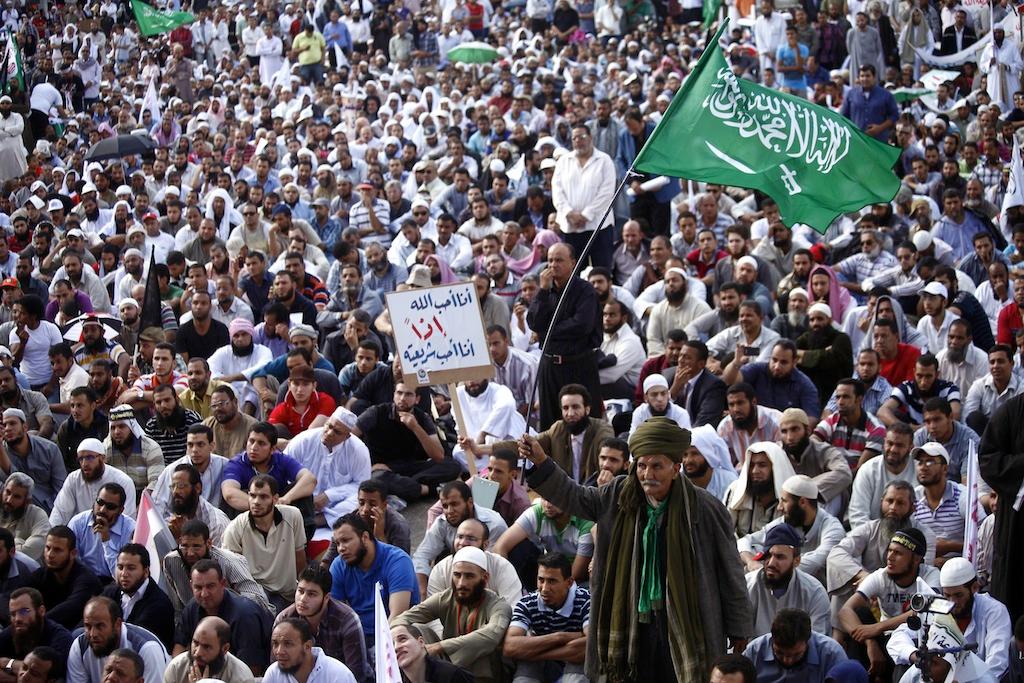Sharia law is empowering Islamist radicals at the expense of secularists
An Egyptian Salafist waves a Saudi flag as hundreds gather for a demonstration at Tahrir Square in Cairo to demand that Sharia be the basis for legislation in a new constitution on Nov. 9, 2012.
PORTLAND, Oregon — The astonishing recent confession of a serving American commander that “[w]e do not understand the [Islamist] movement” calls for a revisit of an old problem.
Two centuries ago, when science began to replace religion as a source for understanding the world, secularists began growing in power. Science gave us an unprecedented mastery over nature, and led to societies that were more advanced than earlier ones.
If one compares how people lived in 1870 with life in 1970, the advancement of society is self-evident. This was true of Muslim societies as well.
In the 1970s, secular dictators ruled most of the Muslim-majority nations. Now, many of these dictatorships are history, and the ones still left are fighting an uphill battle against growing Islamist power whose outlook is regressive.
In most non-Muslim religious communities — Hindus in India, Buddhists in Asia or Christians in Europe, Latin America and Africa — the reverse is true. These communities continue to advance while largely avoiding conflicts and are increasingly democratized.
Historically, Muslim religious ideologues felt that their communities should live by the principles of Islam. This idea was framed in the form of calls to adhere to Sharia, portrayed compellingly as all-encompassing “divine law.” As an interpretation of Islam, Sharia laws vary widely.
In general, they reflect the cultural norms of the Arab tribes of a bygone era. In part, clerics’ or religious ideologues’ prestige and usefulness stem from their status as interpreters of Sharia.
The infusion of modernity and secular ideas into Muslim communities threatened to upend the influence of orthodox leaders. Beginning in the early 1900s, prominent ideologues such as Hassan Al-Banna, and later Sayyid Qutb in Egypt, Abul Maududi in Pakistan and Ruholla Khomeini in Iran started to push back against secularism, by cogently articulating the need for Muslims to live by Sharia laws.
Had oil not been discovered in the Middle East, the calls of the orthodox would have likely been ignored; the price of rejecting modernity certainly would have been poverty.
Iran and Saudi Arabia, prominent Shia and Sunni Islamic nations, respectively, not only found themselves awash in oil wealth, but also provided jobs for millions of Egyptians and Pakistanis, among others.
Starting in the 1970s, Saudi Arabia, the birthplace of Islam and home to its two holy mosques, began a worldwide export of Sharia and armed jihad emphasizing Wahhabism, a conservative and intolerant form of Islam. Saudi-trained clerics told their flock that Allah would reward them with oil wealth if they practice Islam like the Saudis, including a strict adherence to “God’s law (Sharia).”
The Saudis also pioneered religious sponsorship (in addition to the financial one) of armed jihad through the Afghan Islamic insurgency of the 1980s.
In particular, the impact of the emphasis on Sharia has been no less consequential. According to a 2013 Pew Research Center report, in 25 out of 38 nations, the majority of the Muslims surveyed considered Sharia to be the “revealed word of God” and favored making it the law of the land. Among those who favored doing so, in 10 out of 20 nations, the majority supported corporal punishments such as whippings or cutting off the hands of thieves and robbers, much like what Saudi Arabia enforces under its Sharia laws.
Not surprisingly, in a handful of these 25 nations, including Pakistan, Nigeria and Iraq, newly formed militant groups — Tehreek-e-Taliban, Boko Haram and the Islamic State — are waging armed jihad with the intent of imposing strict Sharia-based governance on communities where a mix of modern and Sharia laws prevail.
What then if only a minority supports the above referenced Sharia measures in a Muslim majority nation? Predictably, there can be a welcome possibility: Nations moderate in their outlook that can sustain socioeconomic development. One such nation is Turkey.
Instead of being at the top of counterterrorism policy agenda, Sharia has become an afterthought. For example, in a 2014 address to the United Nations, President Barack Obama called on Muslims to “reject the ideology of [militant] organizations,” without any mention of Sharia.
The issue is not Islam, but those who are pushing the self-serving narrative of Sharia as an all-encompassing divine law. Specifically, much like the successful war of ideas waged against Soviet communism, the West needs to spearhead the effort to undercut this Sharia narrative.
Dr. Moorthy Muthuswamy is a scholar of radicalism who lives in Portland, Oregon.
We want to hear your feedback so we can keep improving our website, theworld.org. Please fill out this quick survey and let us know your thoughts (your answers will be anonymous). Thanks for your time!
